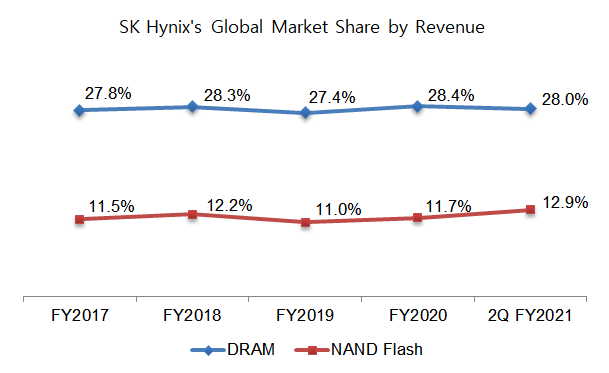SK’s memory chip and AI chip design units collaborate for synergies SK Hynix and Sapeon Korea likely to create synergies in enhancing AI chip performance
Translated by Ryu Ho-joung 공개 2021-12-30 08:09:56
이 기사는 2021년 12월 30일 08시08분 thebell에 표출된 기사입니다
Sapeon Korea will be established on January 4, 2022, as a subsidiary of SK Telecom, with expectations growing that the mobile carrier’s chip design unit will create synergies by collaborating with SK Hynix, one of the world's biggest suppliers of memory chips.The separation of the unit will come about a year after SK Telecom launched the Sapeon X220, the first artificial intelligence chip developed by a South Korean company, in November 2019 as the country’s top mobile carrier sought to diversify away from its mainstay telecom business.
AI chip performance largely depends on how fast a huge amount of data can be processed. While both central processing units (CPUs) and graphics processing units (GPUs) are used for AI processing, they are not perfect. CPUs are fast but optimized to perform basic arithmetic and logical operations. GPUs can process large data sets but have high power consumption.
The Sapeon X220 is optimally designed to process AI tasks by using neural processing units (NPUs), with SK Hynix providing its memory chip expertise to help to design the AI semiconductor. It can process deep learning algorithms 1.5 times faster than GPUs while using 20% less power.
SK Hynix is one of the world's largest producers of memory chips, with the global market shares of its DRAM and NAND flash chips reaching 28% and 12.9%, respectively, in the first half of this year, according to data from research firm IDC. The company also announced the development of its high bandwidth memory DRAM in October.

“We believe SK Hynix is a strong partner for us to develop AI chip technology,” an official at SK Telecom said.
SK Hynix is expected to continue to work with Sapeon Korea to enhance the performance of its AI chip. It is also being considered to use the Sapeon chip to build SK Hynix’s smart factory.
However, it is likely that SK Hynix will not be able to manufacture the Sapeon chip because its foundry technology needs to be further developed. The AI chip requires 12-inch foundry services, which SK Hynix is not offering yet. As a result, SK Telecom asked Taiwan’s TSMC to manufacture the Sapeon X220.
“SK Hynix and Sapeon Korea are expected to collaborate with each other mainly in the chip design area considering SK Hynix’s lagging position in foundry,” an industry insider said.
SK Hynix intends to expand its investment in the non-memory semiconductor business. “We are planning to double our foundry capacity,” Park Jung-ho, the company’s vice chairman said at an event in May. (Reporting by Jang-jun Lee)
< 저작권자 ⓒ 자본시장 미디어 'thebell', 무단 전재, 재배포 및 AI학습 이용 금지 >
관련기사
best clicks
최신뉴스 in 전체기사
-
- '비상경영체 돌입' SKT, 유심 사태 수습 '총력전'
- 위메이드 "위믹스 해킹 늑장공시 아니야…DAXA 기준 불분명"
- [Market Watch]DN솔루션즈 이어 롯데글로벌까지, 대형 IPO '휘청'
- [롯데글로벌로지스 IPO]흥행 실패 우려, 결국 상장 철회로 귀결
- [AACR 2025]제이인츠 'JIN-001', 독성 최소화한 '저농도' 효능 입증
- [Financial Index/SK그룹]주가상승률 50% 상회, SK스퀘어 'TSR' 그룹내 최고
- 금호타이어, 분기 '최대 매출'…영업이익은 '주춤'
- 유지한 SKC CFO "트럼프 관세, 위기보다 기회"
- [i-point]신테카바이오, 'K-BioX 글로벌 SUMMIT 6' 참여
- 간추려진 대명소노그룹 선택지, '티웨이'에 집중






















